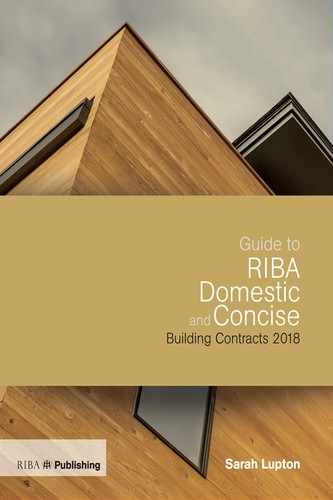About this Guide
The RIBA Concise Building Contract and RIBA Domestic Building Contract were first published in 2014, and were updated and streamlined in 2018 to take account of user feedback. The contracts have proved popular for use on small and medium-scale projects that follow a traditional procurement route, providing useful and innovative alternatives to other standard contracts available. They were designed to be flexible and suited to the needs of consultants and their clients, and the changes have helped to improve their clarity and ease of use.
This Guide assumes no prior knowledge of the contracts, or of construction contract law. As well as examining the provisions of the contracts, it also covers related legal topics, such as relevant legislation, contract formation and dispute resolution. There have been no reported cases involving the RIBA Building Contracts so, as in the previous edition of this Guide, the provisions have been analysed by analogy with existing case law on similar contracts. Many relevant new cases had been added to this edition of the Guide.
The first chapter of the Guide discusses the situations where it may be appropriate to use these contracts and outlines the contracts’ key provisions. Detailed tables compare the contracts with each other and with other standard building contracts. The second chapter examines information that should be included in the tender package, and the formation and execution of the contract. The Guide then introduces the roles of the client, the contractor and the contract administrator, presenting tables of their duties and powers. The remaining chapters look in detail at programming and extensions of time, control of the works, certification and payment, insurance, termination and dispute resolution.
A new chapter has been introduced in this edition, focusing on issues related to practical completion, as this is an aspect of contract administration that can prove problematic in practice. An outline of relevant legislation such as the Housing Grants, Construction and Regeneration Act 1996 and the Consumer Rights Act 2015 is included in a new Appendix.
The contracts have retained a large number of the useful provisions that were in the 2014, such as the collaborative working provisions (pre-start meeting, advance warnings, joint resolution of delay, proposals for improvements and cost savings) and the optional provisions, for example for milestone payments, for a contractor programme, for required specialists (for whom the contractor takes entire responsibly), for contractor design, for new building warranties, and for Public Sector clients. All of these are discussed in the Guide.
In summary, the RIBA Building Contracts continue to offer an attractive option in that they are suitable for a wide range of projects, are relatively short and easy to read, and yet contain a range of innovative features not found in other standard forms.
